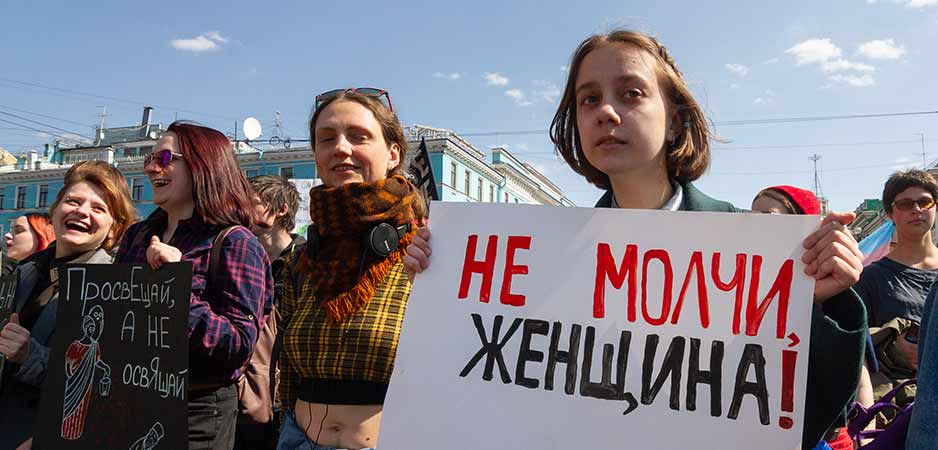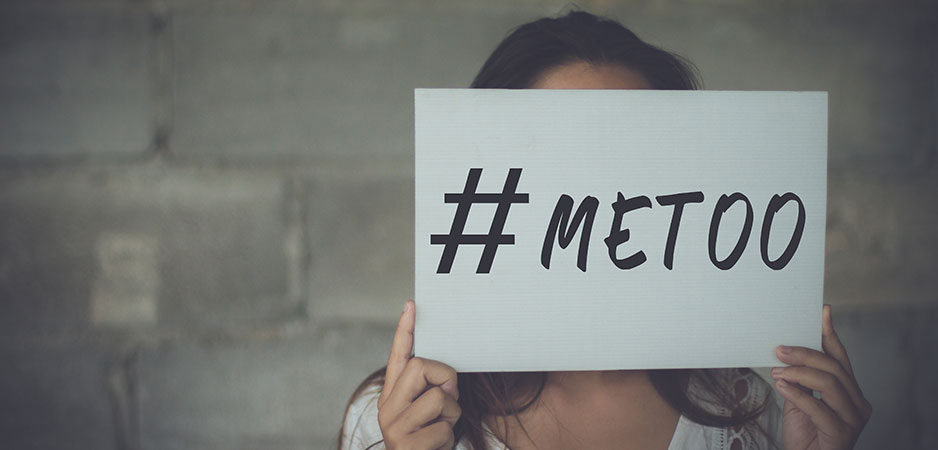Over the last several weeks, Colombia has been making international headlines as social protest engulfed the country. On November 25 — the International Day for the Elimination of Violence against Women — hundreds of Colombian women went out into the streets to claim their rights and shine a spotlight on their struggles.
Their presence was fierce and determined, yet modest — protesters focused on the women’s cause were only a small part of the thousands of citizens, women and men, that have paralyzed the main urban centers of the country since the protests erupted on November 21, defending, among other causes, the peace accord with the Revolutionary Armed Forces of Colombia.
360˚ Insight: Scandinavia’s #MeToo Problem
While a historic step was recently made with the election of the first female mayor of Bogota, Claudia Lopez, who also happens to be a lesbian, there is still a long way to go. In today’s Colombia, the growing movement for the protection of women’s rights lacks force and is still overshadowed by other more prominent but equally important social issues. Nevertheless, the question remains: Will Colombia ever experience a #MeToo revolution?
An Ongoing Tragedy
Data show that the cause of women is a critical issue in Colombia. According to the UN Global Database on Violence against Women, 33% of Colombian women between the ages of 15 and 49 have experienced physical and/or sexual violence from an intimate partner at least once in their lifetime. In the latest Gender Inequality Index, which measures inequality in reproductive health, empowerment and the labor market, Colombia is ranked 98 out of 187. Despite recent efforts by government agencies, such as by the Medicina Legal, 90% of the nearly 34,600 cases that it considers as femicide have not been resolved.
There is a human face and a family story behind each case. Every month, a casual reader of Colombia’s press encounters several cases of gender violence, often involving minors. The cases of Yuliana Samboni, Natalia Ponce and Rosa Elvira Cely are some of the most infamous in recent years and have become national symbols of the fight for women’s rights. Yuliana, a 7-year-old girl from one of Bogota’s marginal neighborhoods, was kidnapped and killed by Rafael Uribe Noguera, a wealthy and accomplished architect, now serving a 51-year sentence. In Natalia’s case, she was attacked by a stalker, who threw acid on her face, causing a tragic disfiguration.
Rosa was 35 years old back in 2012 when she was found raped, stabbed and impaled in Bogota’s national park. After her death, some called for the death penalty for her killer, Javier Velasco, who was later sentenced to 48 years in prison. But some, including Bogota’s secretary of government, blamed the victim. In a polemic statement that has since been retracted, the secretary suggested that it was Rosa’s decision to go out with Velasco for drinks. Victim-blaming is not uncommon in Colombian society, but the fact that a government official was openly taking part in it caused outrage.
All of the crimes inflicted on these women sparked national debates and had repercussions in Colombia’s legislation. Yuliana’s smiling face is a recurrent sight at every protest, including the recent ones. The 2016 Law 1773 is named after Natalia Ponce and has made acid attacks a special type of crime carrying a harsher penalty. And, in Rosa’s name, in 2015 congress passed a historic but controversial Law 1761, by which the criminal charge for femicide was created. For the first time in Colombia’s history, femicides are measured and made visible.
Despite these advances, it is still difficult to speak of a Colombian #MeToo movement. Female-oriented activism is still a minority voice among the demonstrators, even if in the last few weeks more and more Colombians from all political fronts and causes have been taking to the streets. No concrete demands were made of President Iván Duque regarding women’s rights, maybe also because feminism is a controversial topic in a country that has profound Catholic roots, remnants of machismo and few women in the political and cultural sphere. For instance, there are only 56 congresswomen (22%) in the 258-strong body.
Social Change and Accountability
Unfortunately, in Colombia, the defense of women’s rights among the general public is often limited to cyberspace. Hashtags like #YoTambién (“MeToo”), #LibresDeViolencias (“FreeFromViolence”) and #NiUnaMenos (“NotOneLess”) have been in the spotlight of social media channels like Twitter in recent years, with dozens of women telling their stories. Likewise, the Chilean song “El violador eres tú” (“You are the rapist”) has become widely popular.
The increasing number of women engaged in the trend is encouraging, but by itself insufficient. Unlike the cases of Harvey Weinstein, Kevin Spacey and others, Colombia has not yet seen major consequences for allegations made against high-profile men. For instance, in 2018, journalist Claudia Morales claimed that she was once sexually abused by a boss whose name she did not reveal for fear of retaliation, although it is strongly suspected that she meant ex-President Álvaro Uribe. Most people questioned the timing, not the nature of the announcement. In the end, nothing happened.
Likewise, the sexual harassment charges made against Hollman Morris when he was running for mayor of Bogota had little to no impact in his campaign, despite his stand as a leftist, progressive candidate.
All in all, the fight for women’s rights has become increasingly prevalent in today’s Colombia, as demonstrated by advances in matters such as legislation. Nevertheless, it is also an ongoing battle with plenty of unresolved social and political issues that need a grassroots shake-up. A widespread, powerful Colombian #MeToo movement — which seems to be slowly underway — will require a deep questioning of what it means to be a woman in a traditional South American society.
It will also need to involve more citizens, both men and women, in ways that transcend the web and have a transformative societal impact. Only then, when reading about Yuliana, Natalia and Rosa, will Colombians not have to say, #MeToo.
The views expressed in this article are the author’s own and do not necessarily reflect Fair Observer’s editorial policy.
For more than 10 years, Fair Observer has been free, fair and independent. No billionaire owns us, no advertisers control us. We are a reader-supported nonprofit. Unlike many other publications, we keep our content free for readers regardless of where they live or whether they can afford to pay. We have no paywalls and no ads.
In the post-truth era of fake news, echo chambers and filter bubbles, we publish a plurality of perspectives from around the world. Anyone can publish with us, but everyone goes through a rigorous editorial process. So, you get fact-checked, well-reasoned content instead of noise.
We publish 2,500+ voices from 90+ countries. We also conduct education and training programs
on subjects ranging from digital media and journalism to writing and critical thinking. This
doesn’t come cheap. Servers, editors, trainers and web developers cost
money.
Please consider supporting us on a regular basis as a recurring donor or a
sustaining member.
Support Fair Observer
We rely on your support for our independence, diversity and quality.
Will you support FO’s journalism?
We rely on your support for our independence, diversity and quality.

















